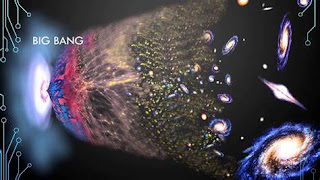Is the Big Bang Compatible with the Bible?
The “big bang” is a fairy tale about how the universe came into existence that is more fitting in the pages of Tolkien’s “Silmarillion” than a science textbook. The theory proposes that billions of years ago the universe began in a tiny, immeasurably hot and dense point called a singularity, which supposedly contained all the mass and energy that would become everything we see today, as well as “space” itself. According to the theory, the singularity rapidly swelled, dispersing all of the energy and space. While this story of origins is entirely fictional, unfortunately many people, even some Christians, believe that it is an accurate explanation of the beginning of the universe. The most disturbing aspect of all this, however, is the fact that Christians who accept the big bang are missing its clearly atheistic roots. As solar astrophysicist Dr. Jason Lisle put it, “They (meaning Christians who believe in the big bang) have chosen to reinterpret the plain teaching of Scripture in an attempt to make it mesh with secular beliefs about origins.” But is there any way the big bang can really fit with what the Bible teaches about creation?
There are multiple reasons why we cannot just add the big bang to the Bible. In the end, the big bang is an utterly secular story of origins. Actually, it was first proposed in an attempt to explain how the universe could have been created without God. It is literally an alternative to the Bible, so trying to make it fit in the Bible is absurd! For one, the Bible teaches that God created the universe in 6 days. It is evident from the original context and Hebrew phrases and wording that they were 6 literal, 24 hour days. A plain, unprejudiced, and literal reading will render it so. However, the big bang teaches that the universe has evolved over billions of years. Moreover, the Bible says that the earth was created before the stars and that trees were created before the sun. But the big bang view teaches the complete opposite! The Bible tells us that the earth was initially created as a paradise (The Garden of Eden, before the Fall); the secular big bang outlook indoctrinates an earth created as a molten blob. All in all, the big bang concept and Scripture most certainly do not agree about the past, nor the future either. Most big bang advocates believe that the universe will expand forever and ultimately be emptied of all utilizable energy. Supposedly, it will remain that way forever in a state of “heat death.” On the other hand, the Bible teaches that the world will be judged and remade and that Paradise will be reinstituted. The big bang disaffirms one of the most momentous doctrines in God’s Word!
The missing monopoles are a serious challenge to the big bang theory. Particle physicists assert that many magnetic monopoles should have formed in the high temperature conditions of the big bang. Yet, even in the face of considerable search efforts, monopoles have not been discovered. Again I will quote the astrophysicist Dr. Jason Lisle, “The fact that we don't find any monopoles suggests that the universe never was that hot. This indicates that there never was a big bang, but it is perfectly consistent with the Bible’s account of creation, since the universe did not start infinitely hot.” Additionally, there is absolutely no credible evidence for “inflation”, which is an idea many secular astronomers have come up with in order to address the flatness problem, the missing monopoles problem, and others. Inflation propounds the idea that the universe went through a period of accelerated expansion. Once more, there is simply no real evidence supporting this theory which, as it happens, has complexities of its own, such as what would start and stop it smoothly. Much like the big bang itself, the idea of inflation is a groundless surmise. And anyway, even if it were true, it does not resolve every difficulty the big bang presents.
The big bang theory simply cannot be a genuinely Christian view, though sadly, many Christians accept it and try to reconcile it to the biblical record. It denies many aspects of Biblical doctrine and invalidates God’s role as the divine Creator who amazingly fine tuned this universe in a way only He, not natural processes, could. On top of that, the big bang has innumerable scientific problems that are indicative of the underlying false worldview. Big bang advocates as well as everyone else who denies the Bible’s teaching are always seeking to convince us Christians that the universe was not supernaturally created but a product of natural processes and chance billions of years ago. However, reality does not line up with this notion.
“In the beginning,GOD created the heavens and the earth.” -Genesis 1:1

.jpg)


Comments